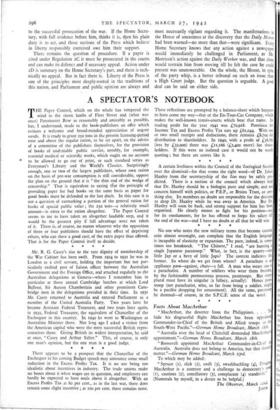Mr. R. G. Casey's rise to the rare dignity of
membership of the War Cabinet has been swift. From 1924 to 1931 he was in London as a civil servant, holding the important but not par- ticularly exalted post of liaison officer between the Australian Government and the Foreign Office, and attached regularly to the Australian delegations at Geneva—where I remember him in particular at those annual Cambridge lunches at which Lord Balfour, Sir Austen Chamberlain and other prominent Cam- bridge men in the delegations presided in their time. In 1931 Mr. Casey returned to Australia and entered Parliament as a member of the United Australia Party. Two years later he became Assistant Federal Treasurer, and two years later again, in 1935, Federal Treasurer, the equivalent of Chancellor of the Exchequer in this country. In 1940 he went to Washington as Australian Minister there. Not long ago I asked a visitor from the American capital who were the most successful British repre- sentatives there. Giving British its widest interpretation, he said at once, " Casey and Arthur Salter." This, of course, is only one man's opinion, but the one man is a good judge.
* * * *


























 Previous page
Previous page